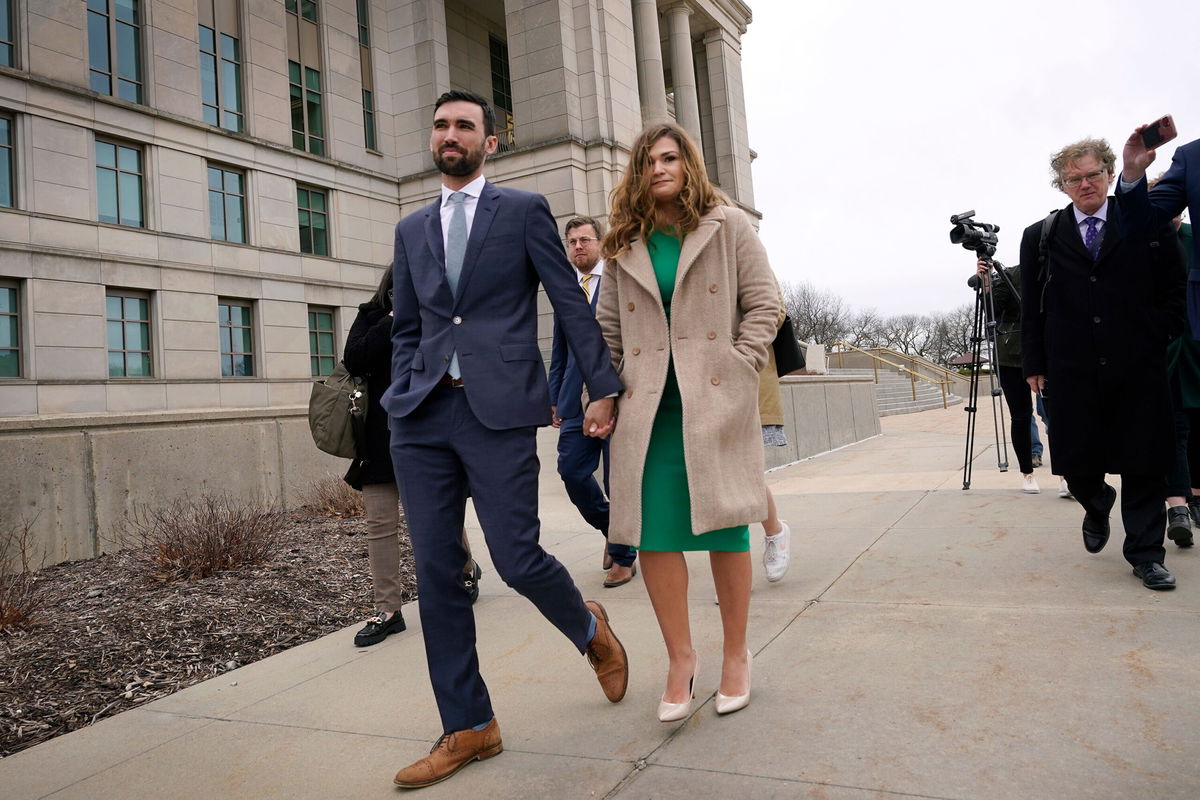Finkenauer lawyer asks Iowa Supreme Court to return her to primary ballot in fight over signatures

A lawyer for Iowa Senate hopeful Abby Finkenauer urged the state Supreme Court on Wednesday to place her back on this year's Democratic primary ballot. Finkenauer is shown here leaving the state Supreme Court building in Des Moines with her husband
By Eric Bradner, CNN
A lawyer for Iowa Senate hopeful Abby Finkenauer urged the state Supreme Court on Wednesday to place her back on this year’s Democratic primary ballot after a judge ruled that she had fallen short of the state’s signature requirements for qualification as a candidate.
The court’s decision, expected by the end of the week, will determine the fate of the campaign of the former congresswoman, whom most Democrats consider to be their strongest challenger to Republican Sen. Chuck Grassley. The longtime senator is seeking an eighth term this fall.
A pair of Republicans had challenged Finkenauer’s candidacy, arguing that she had not met the state’s signature requirements — 3,500 valid signatures, including at least 100 signatures from at least 19 counties — because three signatures did not have dates.
The Iowa Objection Panel, a three-member board that includes the state attorney general and auditor, both Democrats, and the secretary of state, a Republican, voted 2-1 on party lines to keep Finkenauer on the ballot. But late Sunday night, Judge Scott Beattie, who was appointed by Republican Gov. Kim Reynolds, ruled that she had fallen short of the state’s requirements and could not appear on the primary ballot.
The seven-member state Supreme Court, as it heard oral arguments in the case Wednesday, did not tip its hand. Several justices appeared to embrace the legal arguments made by Finkenauer’s lawyer and the state attorney general’s office. Others seemed to side with the Republicans plaintiffs.
Finkenauer’s lawyer, Gary Dickey, argued that the two Republicans who challenged Finkenauer’s petition signatures lacked standing since they aren’t running against her and would not be allowed to vote in Iowa’s Democratic primary unless they became registered Democrats.
He said the state legislature has given the Iowa Objection Panel leeway for decades to allow some undated signatures and noted that the dates of the signatures in question can be ascertained by other signatures on the same page — gathered on the same day.
Sam Langholz, an attorney in the Iowa attorney general’s office who represented the state Objection Panel, which sided with Finkenauer, argued that while state law directs candidates to gather dates as part of the petition process, the law does not directly require signatures that are missing dates to be thrown out.
He pointed to changes to election law approved by state lawmakers in recent decades — including listing other reasons for petition signatures to be thrown out — and said that the legislature would have made it explicitly clear had they intended for signatures missing dates to be scrapped.
Alan Ostergren, a lawyer representing the Republicans seeking to have Finkenauer removed from the ballot, argued that anyone who can vote in a general election has standing to challenge the signatures. He said he could not think of other scenarios under Iowa law in which something is required but there is no consequences for failing to follow that requirement.
Several justices pressed Ostergren about whether there are differences between a mandate, which the Objection Panel would have no ability to ignore, and a directive. One asked him to consider a scenario in which a candidate turned in paperwork that was missing a paperclip or staple and therefore didn’t meet the directive that it be fastened together.
Ostergren also pointed to the Iowa secretary of state’s guidance for candidates that they should gather a large number of signatures, knowing that some would not be counted.
The state Supreme Court is expected to issue a ruling by the end of this week, in time for elections officials to begin printing ballots to be sent to overseas voters ahead of the June 7 primary.
If Finkenauer’s challenge is unsuccessful, she could run as a write-in candidate in the primary. This could be complicated by the fact that although Finkenauer, who represented northeast Iowa in the US House, has been the Democratic front-runner to take on Grassley, she is running against two others in the primary: Glenn Hurst, a city council member in Minden, Iowa, and Mike Franken, a retired Navy admiral who ran for the state’s other Senate seat in 2020.
The-CNN-Wire
™ & © 2022 Cable News Network, Inc., a WarnerMedia Company. All rights reserved.
CNN’s Dan Merica and Ethan Cohen contributed to this report.